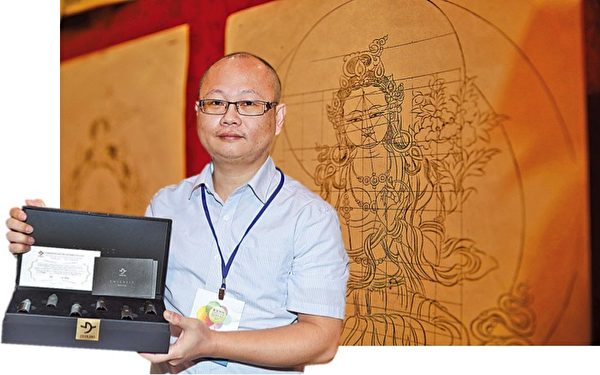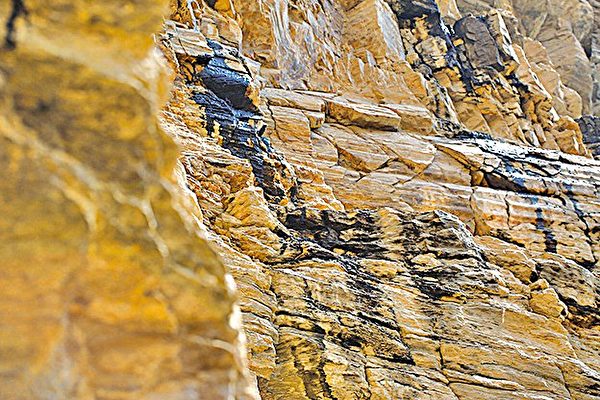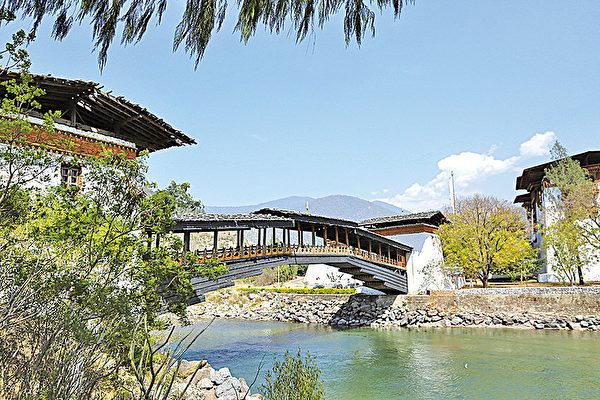Left a comfortable Life, he became a monk, leading him to realized the ultimate cause for diseases.

By Hui-Shin Chow, August 24, 2017- Born in Kaohsiung, Taiwan, Chi Wen was into spiritual practice from an early age. After graduating from college, he followed a monk on an occasion to North India to become a monk himself. During his time in the temple, besides learning language and Dharma, he was exposed to Tibetan medicine, which gained his understanding of the cause of being sick.
“A few years after graduation, I went to North India to become a monk.” Chi Wen said, “That was what I desire most in life: to learn Dharma.”
“North India is very poor, but that was the happiest days in my life.” He explained that it was the environmental hardships in North India that made him give up all the desires and attachments and focused on spiritual practice. He thinks that without those desires and attachments, one can feel true happiness inside.
Became a Monk – Return to the World – Start the Business
After being a monk for 5 years, he decided to return home due to his mom’s illness. 3 years ago, he was informed about “Shilajit” of Bhutan – the last gift from Medicine Buddha for the Dharma-Ending Age, which has magical effects for human health. Hoping to help more people regain their health, he founded a company in Taiwan, Shilajit Biotech Co.,Ltd, to promote organic products and restore traditional lifestyle.
 Chi Wen used to follow a monk to North India to be a monk for 5 years.
Chi Wen used to follow a monk to North India to be a monk for 5 years.
Medicine Buddha’s Last Gift
As a heritage in Himalaya area for thousands of years, Shilajit means “conqueror of mountains” in Sanskrit, “gift of nature” in Nepali, and “Shilajit(喜來芝)” in Chinese. According to the Scripture, it is the promise of Medicine Buddha, a mysterious substance to help people during the Dharma-Ending Age. Ayurveda (Indian traditional medicine) has regarded Shilajit as the foundation of longevity. The Tibetan medicine even sees it as panacea for all weakness.
Hideouts for many spiritual practitioners, Himalaya is called sacred mountain for its purity and spirituality. Shilajit is the treasure in Himalaya’s arms and regarded as a miracle of the mountains.
The formation of Shilajit can be traced back to tens of millions of years ago, when the collision of the Indian and Asian continents created the Himalayan Mountains, compacting huge amount of marine and terrestrial flora into the mountains. Under tremendous pressure, low temperature and over a long period of time, they slowly discomposed and became a natural black fat-like substance, oozing out through cracks in rocks only when it’s hotter in the summertime.
 A treasure in Himalaya’s arms, Shilajit is regarded as a miracle of the mountains.
A treasure in Himalaya’s arms, Shilajit is regarded as a miracle of the mountains.
According to the Ayurveda scripture from India, Shilajit has been used by human for 3000 years. It was highly praised like an elixir and was called “the evictor of weakness and the builder of strength”, “the source of longevity” for the aged, and “the nectar of the Gods”. The Four Tantras in Tibetan medicine also documented in text that the origin of Shilajit is the blessed substance from the vow of Medicine Buddha to help human beings during the Dharma-Ending Age.
A Mysterious Small Country - Bhutan
Located on the south side of the Himalaya Mountains, Bhutan is reputed to be the happiest small country in the world with a population less than 700,000. It used to rank #8 in the World Happiness Report. Bhutan bans the sale of pesticides and relies entirely on animal and agricultural wastes for fertilizers in farming, making it an “organic nation” in food production.
At the time when environmental pollutions are getting worse every day, the “organic nation” – Bhutan – are gaining more and more favor with people around the world. It enjoys pristine nature environment, beautiful landscape, fresh air and as high as 72% forest cover. People there are very unsophisticated and honest.
 Bhutan is reputed to be the happiest country in the world.
Bhutan is reputed to be the happiest country in the world.
According to Chi Wen, royalties, government officials and ordinary people in Bhutan all believe in Buddhism. They use GNH - Gross National Happiness – to replace GDP, stressing that spiritual wealth is more important than money. They included forest protection in the constitution and regulated that 60% forest cover shall be maintained within the country. They emphasize that all beings are equal, including the respect for nature and animals.
There’s a policy in the royal family – never sacrifice nature environment for economic development. Therefore, despite having so many forests, Bhutan does not have a printing Industry. In order to protect the environment, Bhutanese needs approval to even cut a tree.
The resource advantages of Bhutan are forest, minerals and hydropower. However, Bhutan does not focus its development on forestry-based export trading; instead it chooses hydroelectricity as the central pillar of its development. Since hydropower is a renewable energy, resource exhaustion is not a concern; the environmental impacts are relatively small as well.
Chi Wen said that in general, the hydropower plant is built on top of the river; however, after evaluated carefully, they thought that building it the traditional way would harm the nearby forest, destroy the river and influence the fish reproduction. Therefore, they decided to build the power plant underground, taking more than 10 years to complete instead of 2 to 3 years.
In 1986, Bhutan refused the financial assistance from the World Bank to build the dam for a hydropower project because it will submerge a natural preserve.
Chi Wen said that there’s no heavy industry in Bhutan; few light industries. Not even one glass factory, only traditional handicrafts.
Although their GDP is not high, the government appropriates many funds for compulsory education and healthcare. The tuition from elementary school to college is entirely free; healthcare is completely free as well, even for the ill visitors. The government does not use money in military, but regards people’s education and happiness as most important. So they allocate most of the resources on people.
Tibetan Doctors Treat Diseases with Karma in Mind
Chi Wen stressed that the way Tibetan doctors treat diseases is completely different from that of the western doctors. Tibetan doctors would first look at the patient’s karma, then his or her living habits, and finally use medicine.
When facing a patient, a Tibetan doctor would first talk about karma, for illness always associate with attachments, greed or hate towards something and cause one’s body to be off-balance. The doctor would first focus on resolving the patient’s mental issues. “Some skillful Tibetan doctor might not even need to take the pulse. He or she might just talk to the patient and cure the sickness!” Chi Wen said.
Second, Tibetan doctor would spend some time to know the patient: his or her living environment, habits, diet, sleep time, etc., treating each patient as an individual. Even having the same liver disease, due to different causes, everyone would receive different treatment method and medicine.
Chi Wen said, “Tibetan doctor wants to know you as a whole person, because everyone has their own karma. After knowing your diet, he or she might suggest you to consume less spicy foods, reduce food intake, or simply get more sun. If the disease is not serious, after these adjustments and changing habits, the illness could be gone.”
Lastly, Tibetan doctor only gives medicine when he or she has to, meaning the sickness is very severe. Many people praise Tibetan medicine, thinking that it is magical and work like a charm. However, the Tibetan medicine nowadays is not as effective as it was before. It might take 15 pills to treat the disease now compared to 3 pills years ago.
Chi Wen explained, “Tibetan medicine is no longer miraculous because the merit modern people share is getting worse. Some medicinal ingredients have gradually disappeared and couldn’t be found anymore; on the other hand, much of the earth environment has been destroyed. Human greed is so great that results in the degradation of Five Elements in the environment. Without absorbing balanced Five Elements in nature, medicinal herbs would be less effective.”
Human Behavior is Related to Disease.
In addition to the environment, the root cause of the disease is human mind. Buddhists think that greed, anger and ignorance can poison human’s bodily life as well as spiritual life. Hence they are called Three Poisons, the fundamental cause of all troubles on earth.
Chi Wen pointed out that people commonly consider disease as a result of external cause such as the bacteria, the environment, etc. In fact, many diseases result from our own behaviors.
To give an example, he said that many people show “healing crises” after taking Shilajit, meaning that the diseased organ might appear to be “sicker”. In his experience, many patients started to cough as their healing crises. Some might cough badly at night that severely disrupt sleep. Much thick mucus would be coughed up and causes pain. In Chinese Medicine, lung is associated with the Metal Element, symbolizing attack. Detoxing from the lung is most likely due to one’s “verbal karma”, which is commonly seen on people who consider themselves superior and like to point fingers, thinking they’re helping while actually hurting.
“It’s so precise.” Chi Wen said, “Many patients having this reaction are preachers. After talking to them about it, they all nodded and agreed that perhaps they were too critical on stage. Experiencing this detox reaction made them reflect. And after 1 to 2 weeks of dramatic detoxification, their voices became clear and could breathe deeply, ready to talk kind language.”
Another example is Chi Wen’s mother. His mom has been sick for 30 to 40 years. Kidney dialysis was part of her life, and eventually she had to get a kidney transplant. After the transplant was performed, she had to take lots of antirejection medications to prevent her own system to attack the “foreign” organ. Although her health index looked perfect, the side effects from the medications made her extremely weak. Then she started to take Shilajit last year.
Chi Wen explained that when our body starts to experience problems, our organs would suppress the issues that they couldn’t handle. We may look fine, but our organs might have been overloaded. Once the helpful substance is taken, our organs would know that it’s time to release from the suppression. This is what we call “healing crises”.
His mother’s “healing crises” was longer. After about 2 to 3 months, her body started to recover. She looked more energetic and even her diabetes was better managed. When she felt more and more confident, Chi Wen started to discuss the cause of the illness with her.
“My mom has always been nervous about her health conditions. She often worries about her illness, being impatient and irritable. And that was what made her disease-ridden.” Chi Wen said that his mom always likes to complain and victimize herself. She was a glass half empty.
“She’s different now. She has learned how to reflect and say sorry, letting go many things she used to fight for and became happier and happier. She finally feels blessed!”
(Translated from http://www.epochtimes.com/b5/17/8/24/n9560394.htm)